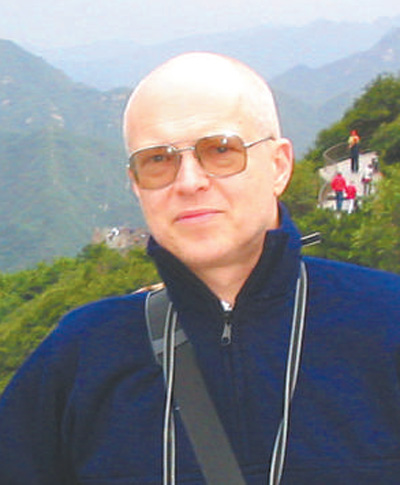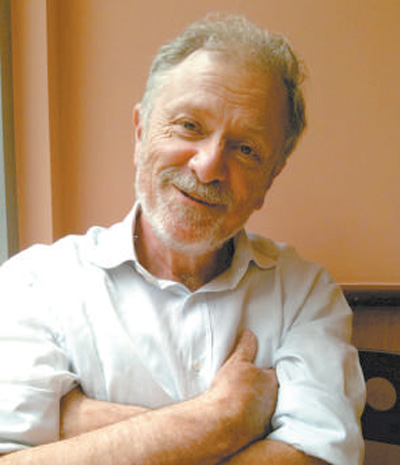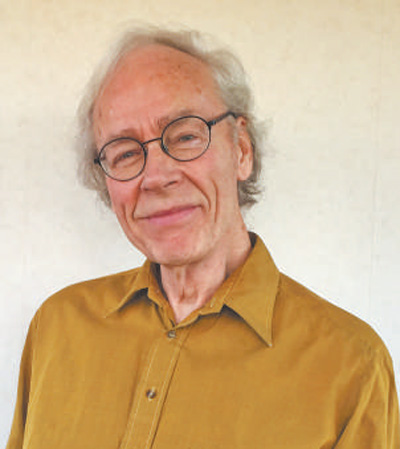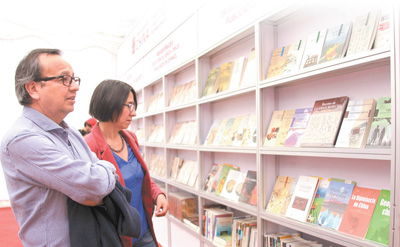Play the role of bridge to promote cultural exchange

Kobzev, Director of China Research Office of Russian Academy of Sciences.
Information picture

Italian translator Casazzi.
Information picture

Swedish translator Roderburg.
Information picture

In 2019, Chile "translated and introduced China — — At the special exhibition "70th Anniversary of China International Publishing", local people stopped to watch China’s fine books.
image china
In the process of China’s culture going abroad, many sinologists and translators who love and devote themselves to the study of China culture have played an important role as a bridge. Their translation of China’s works has achieved good communication effects overseas, which has enabled more foreign people to enhance their knowledge and understanding of China culture in reading.
Kobzev, Director of China Research Office of Russian Academy of Sciences — —
To explore the essence of China’s philosophy as a lifelong pursuit.
Our reporter Zhang Guangzheng
"If I studied Chinese in 1970, I have been studying China culture for more than half a century." Artyom Kobzev, director of the China Research Office of the Institute of Oriental Studies of the Russian Academy of Sciences, has made it his lifelong pursuit to explore the essence of China culture, especially China’s philosophy.
"China culture is characterized by realism and humanism. In China culture, the harmony between individuals and society is regarded as the core value. This is also one of the remarkable characteristics that China culture is different from other cultures. " Kobzev realized that the deeper the study of China culture, the wider the unknown space in this research field.
Kobzev clearly remembers that in 1960, when he was six years old, his father visited China with a delegation of Soviet writers, and after he came back, he shared his experiences and feelings with his family. Kobzev Jr. listened with relish and planted a seed for his future life choice. Ten years later, he chose to study China culture and philosophy at Moscow University.
Since 1978, Kobzev has mainly worked in the Institute of Oriental Studies of Russian Academy of Sciences, and also taught sinology courses at Moscow University of Physics and Technology and Russian National Humanities University. In 1990, Kobzev studied in Peking University for one year.
Since 2002, he has visited China almost once a year, staying for several weeks at a time. "I have been to half of China." Kobzev thinks that studying China is "extremely interesting", not only because China’s topography is rich and varied, but also because China’s culture has a long history and is profound, which is a valuable spiritual wealth for all mankind.
Kobzev has long studied the Book of Changes and the works of Wang Yangming, a philosopher in the Ming Dynasty. He is one of the few Russian experts who study Wang Yangming. In the study of China’s philosophy, he has published more than 10 books and 1,500 academic papers, some of which have been translated into Chinese, English, French, Polish and Ukrainian.
The integrity of China culture left a deep impression on Kobzev. He believes that philosophy is the source of all science and culture, and at the same time, language and philosophy are interrelated and form a unified whole. This is also the reason why his research is not limited to philosophy.
According to Kobzev, in recent decades, he wrote most articles about China’s philosophy in major Russian encyclopedias, including Encyclopedia of Russia and Encyclopedia of New Philosophy. He is also the deputy editor-in-chief of China Philosophy (1994) and China Spiritual and Cultural Ceremony (2006— 2010) and the main author of China Philosophy (2006).
In the field of philosophy, his translations include Confucian classics Daxue and Wang Yangming’s works, as well as Taoist works Tao Te Ching. In the field of literature, he also translated the Book of Songs and Tang poems.
Russian sinology research ranks among the best in the world. In Kobzev’s view, China is extremely rich in culture, and the future cultural exchange between Russia and China will be promising. "The relationship between China and China has reached an unprecedented height, which has brought new opportunities for Russian scholars to fully understand Russian culture. I hope that Russia and China will have more cultural exchanges and cooperation."
Kobzev pointed out that among the four world civilizations with earlier origins, only Chinese civilization has been passed down for thousands of years without interruption. Civilizations and cultures in the world are rich and varied, and there are great differences. Different civilizations and cultures need to promote mutual understanding and achieve harmonious coexistence through in-depth exchanges.
Italian translator Casazzi — —
"Dictionary reference books are very necessary"
Our reporter Ye Qi
"Scholars and translators are often inspired by the spirit of the times." This is the opening remarks made by Italian translator Giorgio Casazzi in an exclusive interview with reporters. Born in Rome in 1949, he was one of the first Italians to study in China. In 1968, he was admitted to the Chinese Department of Rome University. Few people in Europe knew about China at that time. In order to further explore the mystery of China culture, he decided to study in China. From then on, his wonderful experience in China and his love for China culture made him determined to engage in activities related to China culture.
In the early 1970s, Casazzi graduated from Beijing Language and Culture Institute (now beijing language and culture university) and returned to Italy to start his translation career. "At that time, Italians were eager to know about China, but they were basically interested in both politics and economy. Xu He’s Introduction to Political Economy is my first Chinese translation. Two volumes of more than 600 pages, I spent a year to complete the translation, published by a publishing house in Milan, and the response was very good. " After that, Casazzi became a professor of Chinese at the University of Rome and the Oriental University of Naples, which made it more possible for him to choose a wider range of China books for translation.
In Casazzi’s view, China’s vernacular literature is full of interest in style, content and thought, which can be compared with similar literature in Boccaccio. "Fortunately, since the 1980s, Italian domestic interest in China has crossed the political and economic categories and started to involve social sciences such as literature and philosophy." The change of the general environment provides an opportunity for Kasazi to devote himself to the translation of China’s classical Chinese works. In the past decades, from Thirty-six Strategies to Xu Xiake’s Travels, from regular translations to nearly 2,000 pages, he has translated many works of China.
Another important achievement of Kasazi’s dealing with Chinese characters in China is the compilation of dictionaries. During the 11 years since 1998, Kasazi and Bai Yukun of beijing language and culture university collaborated to compile the Chinese-Italian Dictionary, with two volumes, 100,000 entries and a total of 2,300 pages. It was first published in Rome in 2009 and reprinted in Venice in 2013. "Italian dictionaries have a long tradition. In recent years, the relationship between China and Europe is so close that dictionary reference books are very necessary! "
For decades, Casazzi has traveled frequently between Italy and China, telling Italian friends the story of China and spreading the voice of China. "As we all know, China’s culture has a long history, bright and gorgeous, and has lofty value. When it comes to science and scholarship, how can we lack China’s voice? There is an urgent practical need to promote Chinese culture to overseas people. How to optimize the introduction and publicity effect of China culture and how to further clarify its characteristics is the key at present. "
In Casazzi’s view, at this stage of publications, on the one hand, the relevant materials in China are not popular enough, and Italian universities rarely use textbooks and materials written by China scholars; On the other hand, some publications are unscientific, and even some people who don’t understand Chinese are compiling and describing China’s ancient philosophy. There is still much room for improvement in these areas.
"In Italy, most of the translated versions of China’s classical literature have little or no annotations. Nowadays, more and more foreigners are learning Chinese, hoping to read the original Chinese text, get a deeper understanding of the details and analyze the views of different critics in past dynasties. This is why I am now conducting a complete Italian translation of the Book of Songs with comments and comments from previous dynasties, and at the same time I intend to compile a book called China Character System, which comprehensively introduces Chinese characters and their systems. " Kasazi said.
On further promoting cultural exchanges between Italy and China, Casazzi said, "From a broader perspective, I think dialogue is the most powerful way to deepen our understanding of China culture in the world, especially in Italy. When negotiating and communicating, put forward more opinions and listen to each other. "
Swedish translator Roderburg — —
"I have a deeper understanding of the development path of China today."
Our reporter Ren Yan
"In 1979, I translated an essay collection by Lu Xun into Swedish and published it locally. This translation entitled "Hope lies in the future" is my first work in translation. " Roderburg, a Swedish translator, said in an exclusive interview with our reporter a few days ago, "The New Culture Movement is a very important period in the modern history of China. Lu Xun is the leader of the New Culture Movement, and his works shine with the light of thought, which has played an important role in China’s social enlightenment. I have benefited a lot from reading the works of China literary masters such as Lu Xun, and I hope to share a real China with Swedish readers by translating China’s works. "
In the early 1960s, Roderburg, a senior high school student, took a keen interest in the history and culture of China. In order to deepen his understanding, he studied Chinese at Stockholm University, and officially started a journey of exploring China culture. After graduating from college, Roderburg went to China to work as a translator from 1968 to 1970, and went to China again from 1975 to 1977.
20世纪80年代,罗德堡翻译了茅盾的《子夜》和巴金的《寒夜》两部长篇小说,以及两位作家的部分短篇小说。“通过这些作品,中国两位现代文学巨匠首次走进瑞典读者的视野,并深受喜爱。”罗德堡对此感到欣慰。
“改革开放之后,中国当代文学蓬勃发展,涌现出了一大批优秀作家。”罗德堡翻译了一些知名作家的短篇小说,其中包括刘心武、蒋子龙、谌容等作家贴近现实的文学作品。
罗德堡认为,文学能够表现一个国家的社会文化和人民的思想感情,文学作品的翻译可以促使人们加深对彼此国家国情和人民思想的了解,达到民心相通的效果。当今世界,民心相通对于防止冲突和战争至关重要。中国文学是世界文化的重要组成部分,也是中国发展变化的生动写照,通过翻译中国文学作品可以帮助其他国家人民更好地认识中国的过去和现在。“我翻译中国文学作品,就是想把中国故事带到瑞典,让瑞典人更了解中国。”他说。
近几年,罗德堡主要致力于将《习近平谈治国理政》翻译成瑞典语版。“在翻译中国领导人著作的过程中,我对当今中国发展道路有了更深入了解。习近平主席一系列关乎人类前途命运的倡议和理念高屋建瓴,引人深思。”
"I have deep feelings for China. My work and life experience in China is an important part of my life. " Roderburg said, "In addition to working and living in China twice, I visited China many times later and witnessed the vicissitudes of China in the past half century. I admire the great development of China."
In order to promote the publication of books about China in Sweden, Roderburg founded a publishing house in 1990s, named "Crane Publishing House", and published a series of literary works by Jiang Zilong and Mo Yan, such as Red Sorghum. In addition to literary works, the publishing house also publishes books on China’s agricultural development and popular culture and art. In the 21st century, Roderburg translated Mo Yan’s autobiographical novella Change and Zhang Wei’s two novels Fable in September and Song of the Hedgehog.
"For a long time in the past, one of the main reasons why western society didn’t understand China was the language barrier. Translation is a bridge to different languages and cultures, which can make the complex world simple. Although more and more westerners are learning Chinese now, language barriers still exist. It is a good way to translate China’s contemporary literary works into western languages and publish them in order to change some Westerners’ one-sided cognition of China. " Roderburg said.
Roderburg won the 14th Chinese Book Special Contribution Award at the end of last year. He said, "This is a great honor and an encouragement to my translation work. I will also continue to translate China’s literary works so that the Swedish people can understand China more comprehensively. "
Layout design: Cai Huawei